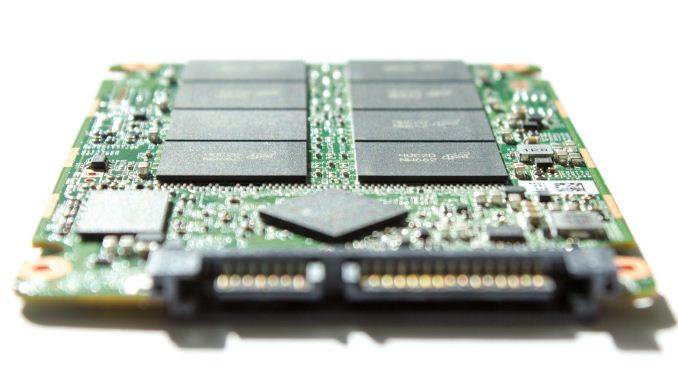Crucial BX100 (120GB, 250GB, 500GB & 1TB) SSD Review
by Kristian Vättö on April 10, 2015 1:20 PM EST- Posted in
- Storage
- SSDs
- Crucial
- Micron
- Silicon Motion
- BX100
- SM2246EN
- Micron 16nm
Final Words
The MX100 was a revolutionary product in many ways. It was the first drive to move to sub-19nm NAND, which brought cost savings along with it. The combination of price and performance made the MX100 arguably one of the most cost efficient drives on the market. The BX100 is more of an evolutionary step from the MX100 as it uses the same 16nm MLC as its foundation, but the switch from a Marvell to a Silicon Motion controller has allowed Crucial to cut the costs by another few percent, while still retaining high performance in typical client workloads.
Talking about performance, the BX100 is a great all-around performer. It performs well regardless of the workload and despite not being designed for IO intensive workloads such as The Destroyer benchmark, the higher capacities (500GB & 1TB) manage to be very close to the higher-end drives. It actually begs a question of whether it's worth it to pay the premium for a high-end drive because in reality you will only be gaining about 10-15% higher performance, whereas the cost premium is much more than that. For professionals who truly need the best IO performance, the premium can be worth it (although you should really be looking at PCIe SSDs already), but for enthusiasts it's safe to say that the BX100 delivers far more bang for the buck than a high-end SSD does (unless you're looking for a 256GB drive or smaller).
Furthermore, the BX100 is extremely power efficient and without a doubt the best drive in terms of power consumption that we have tested. For desktop users that isn't a big deal (unless you pay very close attention to your power bill), but for laptop users I would argue that power consumption is just as important as performance is (if not even more important) because increased battery life is something concrete and easily noticeable.
My only criticism is the fact that Crucial decided not to include TCG Opal and eDrive encryption in the BX100. Like I mentioned on the first page, I understand that the reason behind the move is to differentiate the BX100 and MX200, but it's still a feature that we got accustomed to in Crucial SSDs. I can't say this is a major issue because hardware encryption in the client space is still in its infancy and the software support is poor, but nevertheless it's a feature that I would have liked to see included.
| Amazon Price Comparison (4/10/2015) | ||||
| 120/128GB | 240/250/256GB | 480/500/512GB | 960GB/1TB | |
| Crucial BX100 | $68 | $99 | $185 | $375 |
| Crucial MX200 | - | $110 | $200 | $430 |
| OCZ ARC 100 | $60 | $105 | $170 | - |
| Crucial MX100 | $72 | $110 | $210 | - |
| Intel SSD 530 | $89 | $133 | $245 | - |
| Mushkin Reactor | - | - | - | $371 |
| Samsung SSD 850 EVO | $65 | $107 | $190 | $380 |
| Samsung SSD 850 Pro | $100 | $155 | $290 | $500 |
| SanDisk Ultra II | $70 | $95 | $180 | $360 |
| SanDisk Extreme Pro | - | $146 | $285 | $475 |
| Transcend SSD370 | $58 | $99 | $176 | $360 |
Given that the MX100 was already driving prices down, it comes as no surprise that the BX100 is very competitive in price. The Ultra II and SSD370 are slightly cheaper, but neither of them can provide the same combination of performance and power efficiency as the BX100 does. On that basis I would pick the BX100 over the two since the price delta is rather insignificant anyway (and obviously, pricing fluctuates on a daily and retailer basis). The 850 EVO is also very close in price and offers a little higher performance, but it can't challenge the BX100 in power efficiency, so for mobile users my recommendation would be the BX100, whereas the 850 EVO does offer marginally better value for desktop users.
In a nutshell, I have nothing but positive things to say about the BX100 for its price point, especially when it comes to the higher capacities. The performance is good for all workloads, the power efficiency is top of the class and most importantly, the overall value you get is simply outstanding. If you are on the market for an SSD right now, especially for laptop, I would highly recommend the BX100 even if your workload happens to be heavier than average.












67 Comments
View All Comments
stickmansam - Friday, April 10, 2015 - link
Any thoughts on how performance would be like if the BX100 didn't have the Samsung like OP?bricko - Friday, April 10, 2015 - link
Been researching ssd for a bit, these seem ok, but after watching the Intel discussion of their massive new Intel 750 NVMe, PCIe 3, 1.2 Tb will make one cry, 2-4 times the speed of these old SATA stuff. Half height card for pcie slot. But massive cost, like 1100 for the 1.2 Tb, but the charts are scary. Better with new X99 mobohttp://www.pcper.com/reviews/Storage/Intel-SSD-750...
http://www.anandtech.com/show/9090/intel-ssd-750-p...
Sunburn74 - Saturday, April 11, 2015 - link
But no real world performance benefit for 99% of us.just4U - Friday, April 10, 2015 - link
I think the only real problem I have with the BX100 is ... believe it or not pricing. Here in Canada I've bought 4 of these drives but I've had to scour the net for price match deals to even come close to the MX100 which.. actually was 10-20% lower in costs. Ticks me off really.. their coming close to price parity with the older model but still not there yet.. The Sandisc Ultra2 is cheaper but it's almost always out of stock.. they tried to price this damn thing like the higher end drives. :(stickmansam - Saturday, April 11, 2015 - link
Canada has always suffered by worse off pricing and stock issues.frombauer - Saturday, April 11, 2015 - link
Would this be a tangible empirical upgrade over a 256GB Samsung 840 Pro?Margalus - Saturday, April 11, 2015 - link
no, nothing you would be able to notice in usage.Morawka - Saturday, April 11, 2015 - link
whats up with the 850 EVO scores? do you guys only have laptop drives or something? Wanted to see how it compares to a 2.5" 850 Evo, and obviously the Msata scores dont compare to it.Kristian Vättö - Saturday, April 11, 2015 - link
I haven't had time to put the 2.5" 850 EVOs through our new SSD suite yet, but I have the scores for the mSATA/M.2 versions since we just reviewed those. The performance should essentially be the same though since the hardware is no different.Nordlicht - Saturday, April 11, 2015 - link
It would have been nice to have BX100 being compared to Transcend SSD370. Both use the same controller. However, SSD370 uses Micron's 20nm NAND whereas BX100 uses the next generation 16nm. Performance is similar?On the surface the SSD370 could be more reliable due to bigger feature size. BX100 commands a small price premium, though.